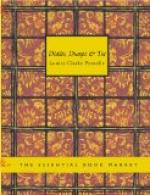“Dumps, what are you talkin’ ’bout?” again interrupted Diddie. “She couldn’t be er foolin’ long o’ nothin’ ef she’s dead.”
“But she ain’t dead, Diddie,” persisted Dumps.
“Well, you said the fire burned her up,” retorted Diddie.
“I don’t care ef hit did,” said Dumps; “she nuver died bout hit; an’ ef you’re goin’ ter keep sayin’ she’s dead, then I sha’n’t tell yer no mo’.”
“Go on, then,” said Diddie, “an I won’t bother you.”
“Well, one time,” continued Dumps, “when she was er foolin’ ‘long o’ cow, what she had no business, the cow run his horns right thorough her neck, an’ throwed her way-ay-ay up yon’er; an’ she nuver come down no mo’, an’ that’s all.”
“But, Dumps, what become of her?” asked Diddie.
“I dunno what become uv her,” said Dumps. “She went ter hebn, I reckon.”
“But she couldn’t go ter hebn ef she’s so bad,” said Diddie; “the angel wouldn’t let her come in,”
“The cow throwed her in,” said Dumps, “an’ the angel wan’t er lookin’, an’ he nuver knowed nothin’ ’bout it.”
“That’s er mighty funny story,” said Diddie; “but I’ll let it stay in the book— only you ain’t finished it, Dumps. Hyear’s fo’ mo’ lines of paper ain’t written yet.”
“That’s all I know,” replied Dumps. And Diddie, after considering awhile, said she thought it would be very nice to wind it up with a piece of poetry. Dumps was delighted at that suggestion, and the little girls puzzled their brains for rhymes. After thinking for some time, Diddie wrote,
“Once ’twas a little girl, and she was so bad,”
and read it aloud; then said, “Now, Dumps, sposin’ you make up the nex’ line.”
Dumps buried her face in her hands, and remained in deep study for a few moments, and presently said,
“And now she is dead, an’ I am so glad.”
“Oh, Dumps, that’s too wicked,” said Diddie. “You mustn’t never be glad when anybody’s dead; that’s too wicked a poetry; I sha’n’t write it in the book.”
“Well, I nuver knowed nuthin’ else,” said Dumps. “I couldn’t hardly make that up; I jes had ter study all my might; and I’m tired of writin’ poetry, anyhow; you make it up all by yourse’f.”
Diddie, with her brows drawn together in a frown, and her eyes tight shut, chewed the end of her pencil, and, after a few moments, said,
“Dumps, do you min’ ef the cow was to run his horns through her forrid stid of her neck?”
“No, hit don’t make no diffrence to me,” replied Dumps.
“Well, then,” said Diddie, “ef ’twas her forrid, I kin fix it.”
So, after a little more study and thought, Diddie wound up the story thus:
“Once ’twas er little girl,
so wicked and horrid,
Till the cow run his horns right
slap through her forrid,
And throwed her to hebn all full
of her sin,
And, the gate bein open, he pitched
her right in.”




